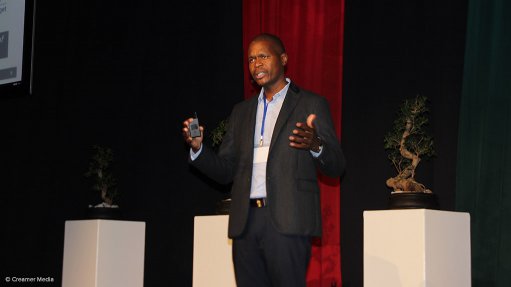
LUCKY KGATLE For the industry to achieve the goal of zero harm, it is going to take serious leadership to create a culture where people feel cared for and respected
Safe and healthy employees at all levels, operating within a culture of care and respect, create direct value through, for example, reduced absenteeism, and indirect benefits, such as higher levels of efficiency, morale and cooperative teamwork, says petrochemicals group Sasol mining subsidiary Sasol Mining senior VP Lucky Kgatle.
“I firmly believe that safety is a leading indicator of a wide range of business performance indicators. Therefore, if we get safety right, the rest of the mining industry’s components should fall into place,” he states.
However, Kgatle says, for the industry to achieve the goal of zero harm, it is going to take sound leadership to create a culture where people feel cared for and respected.
He points out that the local mining industry in recent years has made progress in improving safety standards, but that there are still incidents that occur on mines that lead to fatalities, which clearly means that more attention has to be paid to prevent such incidents from occurring in the first place.
Kgatle believes that mining industry leaders need to challenge existing thought paradigms, which hold that the mining sector is inherently dangerous, therefore casualties and injuries are bound to occur.
“We have to always remind ourselves as industry leaders that those injury and fatality statistics reflect the lives of ordinary working class people, who are, in many cases, a family’s sole breadwinner. The stakes for ensuring the highest levels of health and safety at mines are very high and we just cannot afford to be complacent about this very serious issue,” he emphasises.
To make a step change in how the industry views health and safety, mines need to adopt a holistic approach to this issue, Kgatle declares.
He highlights that a number of key principles need to be realised to ensure this, namely having visible-felt leadership, ensuring there is a two-way engagement between employees and management, establishment of a system that rewards and recognises employees that perform their tasks safely and efficiently, the establishment of a culture of learning in the workplace, ensuring that all of the industry’s key stakeholders support action plans and putting in place a comprehensive programme demonstrating proactive avoidance factors with a care and concern emphasis.
Additionally, Kgatle comments that it is critically important that workplace risks are engineered out and that the highest levels of health and safety compliance are adhered to throughout a company.
Further, he stresses that no one mining company can go it alone, as the only approach that will work is an “industry-led approach”.
“This means much stronger co-investment by mining companies in health and safety systems will be required in the years to come,” Kgatle remarks.
He raises a number of proposals that the coal miners, in particular, should take on board to achieve zero harm.
“We need to integrate the industry’s approach to health and safety with local communities to enable us to partner with families, churches and community leaders in a different way to give our people a reason to come home safe,” states Kgatle.
He says that a Coal Technology Investment Fund should also be established by coal miners to develop new technologies that can help eliminate, and not only reduce, dust and thereby strengthen mine infrastructure.
Kgatle further proposes that a Coal Centre of Leadership Excellence be established to ensure an integrated industry effort around hiring empathetic leaders and training new leadership skills, which provide, among other things, a coaching mentality and a caring leadership.
“Ultimately, the realisation of these proposals would ensure that we could come together as the coal industry, along with government and labour, to achieve the goal of zero harm,” he concludes.
Kgatle was a keynote speaker at the South African Colliery Management Association’s recent 2016 CoalSafe conference in Secunda, Mpumalanga.